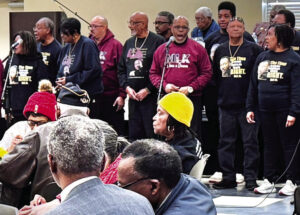Town debates councilman's residency
By Staff
Melissa Cason
HODGES – Tuesday will be municipal elections throughout the state, and voters will be going to the polls to make their choice on who will lead their town or city.
But, what if the person they choose decides to move out of the town or city's limits?
Should the elected official resign?
This issue has come to light in the town of Hodges.
A long-time council member moved outside the town's limits within a few months of beginning his second term on the town council four years ago.
Terry Petree served Hodges as a council member for eight years, even though he has lived outside the town's limits since Jan. 31, 2005, which was shortly after taking office for his second term.
Petree said he made no effort to hide that he had moved and that it was public knowledge that he lived out of town.
Yet, no one said anything about it until now, near the end of the term.
"Everybody in town knew I moved out here, and nothing was said," Petree said. "If something had been said, I would have resigned."
Mayor Ed Crouch said no one ever gave the matter a second thought, and that 11-43-587 Code of Alabama, 1975, gives the council the responsibility to decide whether a candidate is eligible to hold public office.
The code says the council has the responsibility of judging the qualifications of its members.
"Nothing was ever brought up at the council meetings and the issue was not discussed," Crouch said.
However, Tracy Roberts, Assistant General Council with the Alabama League of Municipalities, said Petree should have resigned when he made his move or been removed from office.
Roberts referred to 36-2-1, Code of Alabama, 1975 that states those who have not been inhabitants of the state, county, district or for the period required by the constitution and laws should be removed from office. 36-2-2 states that any person being disqualified by law, who by election or appointment enters upon any public office must, on conviction, be fined no less than $100.
Roberts said these laws mean that if you are not a resident of the town, you cannot hold a public office in that town, and if you do, and are charged under 36-2-2, you could be fined for disobeying the law.
"If he moved out of town after being elected into office, he should have resigned," Roberts said. "Since he didn't he could have been removed from office."
Roberts said the district attorney, the attorney general or a voter could have filed a petition in circuit court to have Petree removed from office. The judge would then decide whether Petree should be removed.
"It's too late to do anything now," Roberts said. "There would never be a court date set before November."
According to county records, Petree moved two-tenths of a mile outside the town's limits. Petree and Crouch both said the area where Petree lives will be annexed into the town's limit.
Petree is not seeking office this term.






